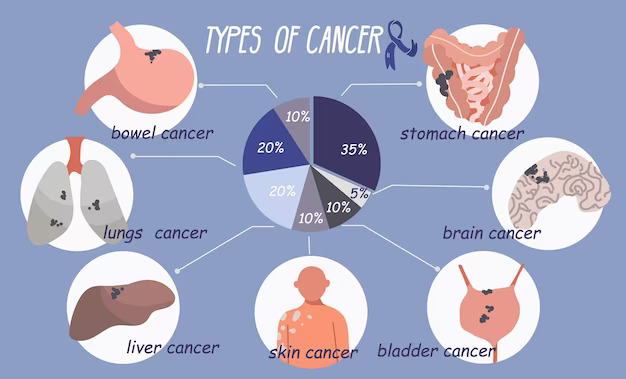
types of cancer
Introduction to types of cancers
Cancer is a complex and devastating disease that affects millions of people globally. It is a condition where abnormal cells divide and invade surrounding tissues, causing damage and potentially spreading to other parts of the body. There are numerous types of cancers, each with its own characteristics and treatment options. In this article, we will delve into the different types of cancers, from the common to the rare, providing insights into how they occur, how to prevent them, and whether they are curable.
Common types of cancers
Lung cancer
Lung cancer is one of the most prevalent types of cancers, accounting for a significant number of cancer-related deaths. It occurs when abnormal cells in the lungs grow uncontrollably, forming tumors that can impair lung function. Smoking is the primary cause of lung cancer, making it crucial to quit smoking and avoid exposure to secondhand smoke. Early detection through regular screenings and awareness of symptoms can significantly improve the chances of successful treatment. While the prognosis for lung cancer varies, advancements in treatment options have increased the survival rates in recent years.
Breast cancer
Breast cancer predominantly affects women but can also occur in men. It develops when abnormal cells in the breast multiply and form a tumor. Regular breast self-examinations, clinical breast exams, and mammograms are essential for early detection. Adopting a healthy lifestyle, such as maintaining a balanced diet and engaging in regular exercise, can contribute to reducing the risk of breast cancer. With advancements in medical technology and treatments, the prognosis for breast cancer patients has improved significantly, emphasizing the importance of early diagnosis and timely intervention.
Prostate cancer
Prostate cancer is exclusively found in men and primarily affects the prostate gland. It develops when abnormal cells in the prostate multiply and form tumors. Age, family history, and certain genetic factors can increase the risk of prostate cancer. Regular screenings, such as prostate-specific antigen (PSA) tests, can aid in early detection. Lifestyle modifications, including a healthy diet and regular exercise, may help reduce the risk of developing prostate cancer. The curability of prostate cancer depends on various factors, including the stage and aggressiveness of the disease. Early diagnosis and appropriate treatment can improve outcomes significantly.
Colorectal cancer
Colorectal cancer affects the colon or rectum and usually originates from polyps, which are abnormal growths in the inner lining of the large intestine. Regular screenings, such as colonoscopies, can help detect and remove polyps before they turn cancerous. A high-fiber diet, regular physical activity, and avoiding excessive alcohol consumption and smoking can contribute to preventing colorectal cancer. The prognosis for colorectal cancer depends on the stage at diagnosis, emphasizing the importance of early detection through regular screenings. Advanced treatment options, including surgery, chemotherapy, and targeted therapies, are available for managing colorectal cancer.
Skin cancer
Skin cancer is the most common type of cancer worldwide and primarily caused by exposure to ultraviolet (UV) radiation from the sun or artificial sources like tanning beds. Protecting the skin from sun exposure by wearing protective clothing, using sunscreen, and avoiding indoor tanning can significantly reduce the risk of skin cancer. Regular self-examinations of the skin to identify any changes or suspicious moles are crucial for early detection. The prognosis for skin cancer is generally favorable when detected and treated early, making education and awareness about prevention and early detection vital.
Rare types of cancers
Pancreatic cancer
Pancreatic cancer is a rare but aggressive type of cancer that affects the pancreas, an organ responsible for producing digestive juices and hormones like insulin. The exact cause of pancreatic cancer is often unknown, although risk factors such as smoking, obesity, and family history can increase the likelihood of developing the disease. There are currently no effective screening tests for pancreatic cancer, making awareness of symptoms, such as jaundice and unexplained weight loss, crucial for early detection. Treatment options for pancreatic cancer are limited, and the prognosis is often poor, highlighting the need for ongoing research and advancements in treatment modalities.
Ovarian cancer
Ovarian cancer primarily affects women and occurs when abnormal cells in the ovaries multiply and form tumors. While the exact cause of ovarian cancer is unknown, factors such as family history, age, and certain genetic mutations can increase the risk. Regular pelvic exams and awareness of symptoms, such as bloating, abdominal pain, and changes in bowel habits, can aid in early detection. Surgical removal of the ovaries and fallopian tubes, along with chemotherapy, is often the primary treatment approach. The prognosis for ovarian cancer varies depending on the stage at diagnosis, with early detection leading to better outcomes.
Thyroid cancer
Thyroid cancer develops in the cells of the thyroid gland, which controls metabolism in the body. Exposure to radiation, family history, and certain inherited conditions can increase the risk of developing thyroid cancer. Regular self-examinations of the neck and awareness of symptoms like a lump or swelling can aid in early detection. Treatment options for thyroid cancer include surgery, radioactive iodine therapy, and thyroid hormone therapy. The prognosis for thyroid cancer is generally favorable, with high survival rates, particularly for early-stage cases.
Sarcoma
Sarcoma is a rare type of cancer that develops in the connective tissues, such as bones, muscles, and fat. It can occur in any part of the body and often manifests as a lump or swelling. The exact cause of sarcoma is unknown, but certain genetic conditions and exposure to radiation can increase the risk. Early diagnosis through imaging tests and biopsies is crucial for determining the appropriate treatment approach, which may include surgery, radiation therapy, and chemotherapy. The prognosis for sarcoma depends on various factors, including the location, size, and stage of the tumor.
Conclusion
Understanding the different types of cancers, their causes, preventive measures, and treatment options is crucial in the fight against this devastating disease. From common types, such as lung, breast, prostate, colorectal, and skin cancers, to the rarer types like pancreatic, ovarian, thyroid, and sarcoma, each requires attention and awareness. Regular screenings, adopting a healthy lifestyle, and early detection can significantly improve outcomes and increase the chances of successful treatment. By staying informed and taking proactive measures, we can contribute to reducing the burden of cancer and improving the lives of those affected.
Remember, knowledge is power in the battle against cancer, so spread awareness and prioritize your health.





